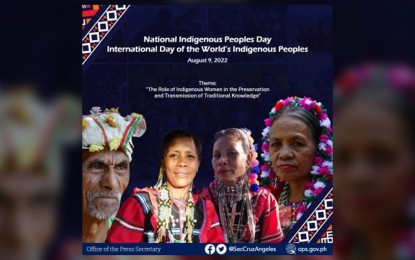
MANILA – Press Secretary Trixie Cruz-Angeles on Tuesday called on Filipinos to take time to learn more about the important role of indigenous peoples (IPs) in promoting Philippine culture and identity.
She made this call as the Office of the Press Secretary joins the country in celebrating National Indigenous Peoples Day.
Cruz-Angeles described the event as an opportunity to honor IPs and other ethnic groups in the country and around the world.
“Ito rin ay pagkakataon upang alamin at kilalanin ang mahalagang papel ng mga katutubo sa pagtaguyod sa mga kaalaman at kultura na bahagi ng ating pang-araw-araw na buhay sa kasalukuyan (This is also an opportunity to learn and recognize the important role of indigenous people in promoting the knowledge and culture that are part of our daily lives today),” she said in a Facebook post.
She specifically mentioned the valuable contributions made by indigenous women in their communities.
“Bahagi nito ang mga mahahalagang aral at kaalaman mula sa mga babaeng katutubo na nagsilbing pundasyon at nagpakita sa lipunan ng mahalagang papel ng mga babae sa pangangalaga ng pamilya, lipunan, at bansa (Part of this are important lessons and knowledge from indigenous women who served as the foundation and showed society the important role of women in the care of the family, society, and country),” she added.
National Indigenous Peoples Day is celebrated as a special working holiday in the Philippines every August 9 following the passage of Republic Act (RA) No. 10689.
The United Nations (UN) General Assembly decided on December 23, 1994 that the International Day of the World’s Indigenous People will be observed on August 9 every year.
The date marks the day of the first meeting of the UN Working Group on Indigenous Populations in 1982.
This year’s celebration carries the theme “The Role of Indigenous Women in the Preservation and Transmission of Traditional Knowledge.”
According to the UN, indigenous women have an integral collective and community role as carers of natural resources and keepers of scientific knowledge.
“Many indigenous women are also taking the lead in the defense of lands and territories and advocating for indigenous peoples’ collective rights worldwide,” the UN said.
However, despite the crucial role that indigenous women play in their communities as breadwinners, caretakers, knowledge keepers, leaders and human rights defenders, they often suffer from intersecting levels of discrimination on the basis of gender, class, ethnicity and socioeconomic status.
Their right to self-determination, self-governance and control of resources and ancestral lands have been violated over centuries.
“Small but significant progress has been made by indigenous women in decision-making processes in some communities. They are leaders at local and national levels, and stand at the frontlines of defending their lands, their cultures, and their communities. The reality, however, remains that indigenous women are widely under-represented, disproportionately negatively affected by decisions made on their behalf, and are too frequently the victims of multiple expressions of discrimination and violence,” the UN added.
Recognize IPs’ governance role
In his message for the occasion, Department of the Interior and Local Government (DILG) Secretary Benjamin Abalos Jr. urged local government units (LGUs) to give IPs bigger participation in governance.
"As mandated in Republic Act No. 8371 (Indigenous Peoples Rights Act of 1997), we urge local government units of the IP's right to participate in decision-making matters which may affect their rights, lives, and destinies. We shall all strive to have an IP Mandatory Representative (IPMR) in policy-making bodies and other local legislative councils to ensure that the carriers of our cultural heritage have a voice and say in governance," Abalos said.
Abalos also urged LGUs to work with national government agencies to incentivize IPs that excel in various governance criteria including heritage development, culture, and arts through the awarding of the Seal of Good Local Governance.
Abalos also recognized the IPs’ rich and diverse culture and vibrant traditions across the country, stressing that these contribute to the formation of a national identity that must be preserved across generations and treated with respect and honor.
He said the government will continue to fight for the rights of every Filipino, including IPs, and advance the protection of their rights and collective well-being within the framework of national unity and development.
"Pursuing our mandate of fostering peacefully and happy communities, we at the DILG will actively advance the rights of ICCs (indigenous cultural communities)," he said. (with Lloyd Caliwan/PNA)
